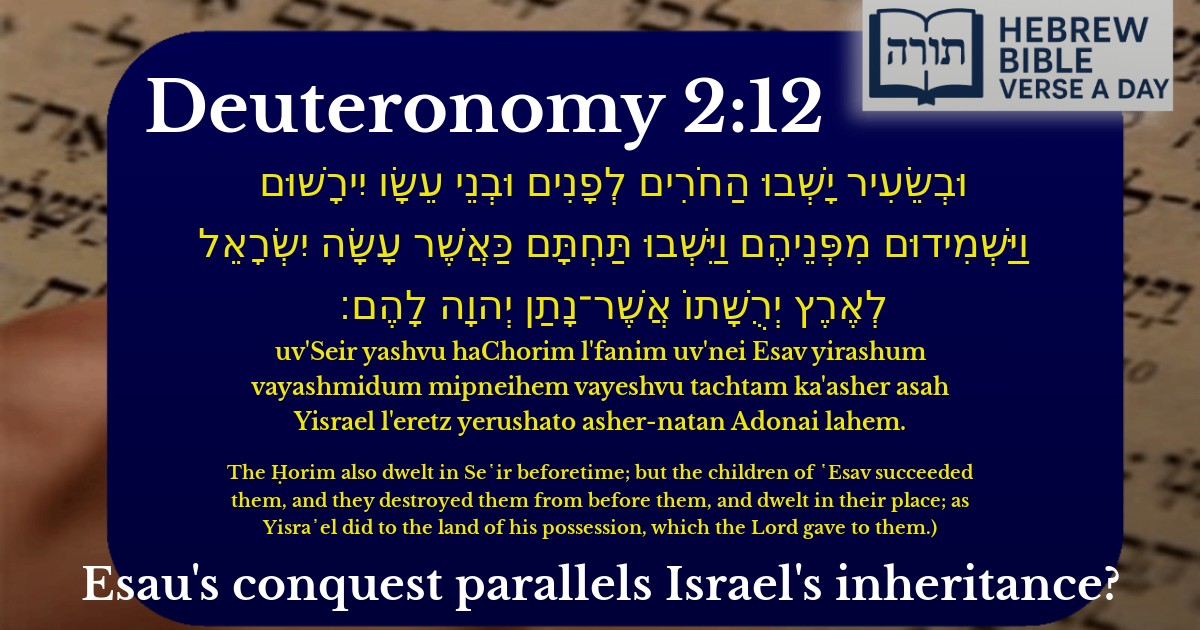Join Our Newsletter To Be Informed When New Videos Are Posted
Join the thousands of fellow Studends who rely on our videos to learn how to read the bible in Hebrew for free!
Hebrew Text
וּבְשֵׂעִיר יָשְׁבוּ הַחֹרִים לְפָנִים וּבְנֵי עֵשָׂו יִירָשׁוּם וַיַּשְׁמִידוּם מִפְּנֵיהֶם וַיֵּשְׁבוּ תַּחְתָּם כַּאֲשֶׁר עָשָׂה יִשְׂרָאֵל לְאֶרֶץ יְרֻשָּׁתוֹ אֲשֶׁר־נָתַן יְהוָה לָהֶם׃
English Translation
The Ḥorim also dwelt in Se῾ir beforetime; but the children of ῾Esav succeeded them, and they destroyed them from before them, and dwelt in their place; as Yisra᾽el did to the land of his possession, which the Lord gave to them.)
Transliteration
Uv'Seir yashvu haChorim l'fanim uv'nei Esav yirashum vayashmidum mipneihem vayeshvu tachtam ka'asher asah Yisrael l'eretz yerushato asher-natan Adonai lahem.
Hebrew Leining Text
וּבְשֵׂעִ֞יר יָשְׁב֣וּ הַחֹרִים֮ לְפָנִים֒ וּבְנֵ֧י עֵשָׂ֣ו יִֽירָשׁ֗וּם וַיַּשְׁמִידוּם֙ מִפְּנֵיהֶ֔ם וַיֵּשְׁב֖וּ תַּחְתָּ֑ם כַּאֲשֶׁ֧ר עָשָׂ֣ה יִשְׂרָאֵ֗ל לְאֶ֙רֶץ֙ יְרֻשָּׁת֔וֹ אֲשֶׁר־נָתַ֥ן יְהֹוָ֖ה לָהֶֽם׃
וּבְשֵׂעִ֞יר יָשְׁב֣וּ הַחֹרִים֮ לְפָנִים֒ וּבְנֵ֧י עֵשָׂ֣ו יִֽירָשׁ֗וּם וַיַּשְׁמִידוּם֙ מִפְּנֵיהֶ֔ם וַיֵּשְׁב֖וּ תַּחְתָּ֑ם כַּאֲשֶׁ֧ר עָשָׂ֣ה יִשְׂרָאֵ֗ל לְאֶ֙רֶץ֙ יְרֻשָּׁת֔וֹ אֲשֶׁר־נָתַ֥ן יְהֹוָ֖ה לָהֶֽם׃
🎵 Listen to leining
Parasha Commentary
📚 Talmud Citations
This verse is not quoted in the Talmud.


Historical Context of Se'ir and the Horim
The verse describes the displacement of the Horim (הַחֹרִים) by the descendants of Esav (עֵשָׂו) in the land of Se'ir (שֵׂעִיר). According to Rashi (Devarim 2:12), the Horim were an ancient people who originally inhabited Se'ir before being conquered by Esav's descendants. The Torah emphasizes that this conquest parallels Israel's later possession of Canaan, highlighting Divine providence in land allocation.
Parallel Between Esav's Conquest and Israel's Inheritance
The phrase "כַּאֲשֶׁר עָשָׂה יִשְׂרָאֵל" ("as Israel did") draws a comparison between Esav's conquest of Se'ir and Israel's conquest of Canaan. Ramban (Devarim 2:12) explains that this serves as a justification for Israel's possession of Canaan—just as Esav rightfully inherited Se'ir after defeating its inhabitants, so too did Israel inherit the land promised to them by Hashem.
The Horim and Their Identity
Midrash Bereishit Rabbah (82:13) identifies the Horim as cave-dwellers (from "חוֹר," meaning "hole" or "cave"), possibly giants or a powerful nation. Their defeat by Esav's descendants fulfills the blessing given to Esav (Bereishit 27:39-40), where he was promised a land of abundance through conquest.
Lessons in Hashgachah Pratit (Divine Providence)
The Malbim emphasizes that this verse teaches the principle of השגחה פרטית—Hashem directs history, ensuring nations rise and fall according to His plan. Just as Esav's conquest was Divinely sanctioned, so too was Israel's inheritance of Eretz Yisrael, reinforcing the uniqueness of Am Yisrael's covenant with Hashem.